Book Reviews
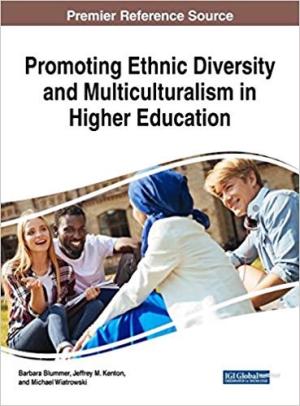
As the world becomes more navigable, opportunities arise for people to live in different countries and for students to study internationally. Such capabilities require universities and other institutions of higher learning to accommodate cultural diversity. Promoting Ethnic Diversity and Multiculturalism in Higher Education is an essential scholarly publication that examines the interaction between culture and learning in academic environments and the efforts to mediate it through various educational venues. Featuring coverage on a wide range of topics including intercultural competence, microaggressions, and student diversity, this book is geared towards educators, professionals, school administrators, researchers, and practitioners in the field of education. (From the Publisher)
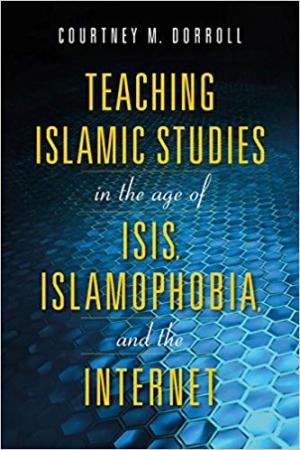
Teaching Islamic Studies in the Age of ISIS, Islamophobia, and the Internet provides clear, feasible suggestions and theoretical tools to address the challenges teachers of Islamic Studies face. (From the Publisher)
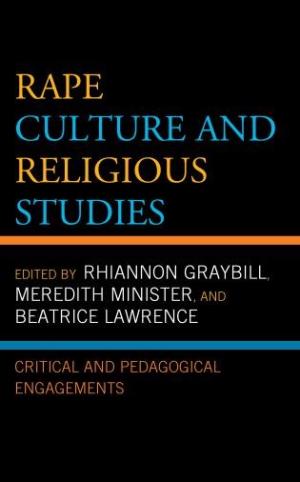
Rape Culture and Religious Studies: Critical and Pedagogical Engagements stages a critical engagement between religious texts and the problem of sexual violence. Rape and other forms of sexual violence are widespread on college and university campuses; they also occur in sacred texts and religious traditions. The volume addresses these difficult intersections as they play out in texts, traditions, and university contexts. The volume gathers contributions from religious studies scholars to engage these questions from a variety of institutional contexts and to offer a constructive assessment of religious texts and traditions. (From the Publisher)
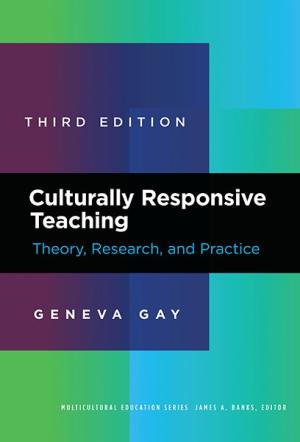
Geneva Gay is renowned for her contributions to multicultural education, particularly as it relates to curriculum design, professional learning, and classroom instruction. Gay has made many important revisions to keep her foundational, award-winning text relevant for today’s diverse student population, including: new research on culturally responsive teaching, a focus on a broader range of racial and ethnic groups, and consideration of additional issues related to early childhood education. Combining insights from multicultural education theory with real-life classroom stories, this book demonstrates that all students will perform better on multiple measures of achievement when teaching is filtered through students’ own cultural experiences. This perennial bestseller continues to be the go-to resource for teacher professional learning and preservice courses. While retaining its basic organization and structure, the Third Edition features: -New research that validates the positive effects of culturally responsive teaching. -Examples that broaden the racial and ethnic groups that can benefit from culturally responsive teaching. -More information on the needs and benefits of culturally responsive teaching with young children. -More attention to the quality of life for students of color in colleges and universities. -The addition of Practice Possibilities at the end of chapters that describe how culturally responsive teaching can be implemented. (From the Publisher)
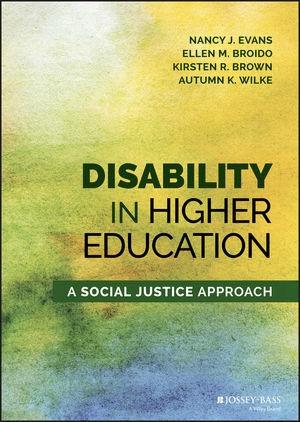
Disability in Higher Education: A Social Justice Approach examines how disability is conceptualized in higher education and ways in which students, faculty, and staff with disabilities are viewed and served on college campuses. Drawing on multiple theoretical frameworks, research, and experience creating inclusive campuses, this text offers a new framework for understanding disability using a social justice lens. Many institutions focus solely on legal access and accommodation, enabling a system of exclusion and oppression. However, using principles of universal design, social justice, and other inclusive practices, campus environments can be transformed into more inclusive and equitable settings for all constituents. The authors consider the experiences of students, faculty, and staff with disabilities and offer strategies for addressing ableism within a variety of settings, including classrooms, residence halls, admissions and orientation, student organizations, career development, and counseling. They also expand traditional student affairs understandings of disability issues by including chapters on technology, law, theory, and disability services. Using social justice principles, the discussion spans the entire college experience of individuals with disabilities, and avoids any single-issue focus such as physical accessibility or classroom accommodations. (From the Publisher)
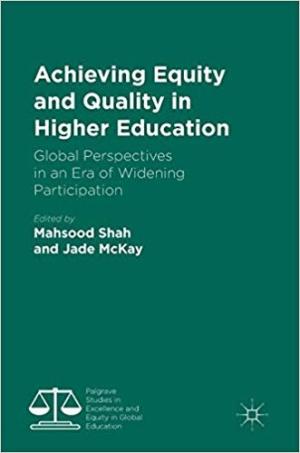
Across the world, higher education is witnessing exponential growth in both student participation and types of educational providers. One key phenomenon of this growth is an increase in student diversity: governments are widening access to higher education for students from traditionally underrepresented groups. However, this raises questions about whether this rapid growth may in face compromise academic quality. This book presents case studies of how higher education institutions in diverse countries are maintaining academic excellence while increasing the access and participation of students from historically underrepresented backgrounds. Including case studies spanning four continents, the authors and editors examine whether increasing widening participation positively impacts upon academic quality. This volume will be of interest and value to students and scholars of global higher education, representation and participation in education, and quality in higher education. (From the Publisher)

This book is not a list or an overview of various theories of ethics. Nor is it a didactic manual for specific teaching units on moral education aimed at some group based on age or a particular theme (although some educational frameworks will be proposed). As the title suggests, the book intends to seek the starting points or foundations without which no moral education would be possible. The goal is to formulate and tackle the key questions that precede all moral education. What makes “good vs. evil” language possible and meaningful? Can virtue be taught and learned? What makes our actions good? What is the condition of human nature? Are we naturally good, or evil? What constitutes an educator’s right to morally influence anyone else (not just a child)? What is the goal of moral education? What does a morally educated person look like? And how can we ensure the coveted moral result? Or—in the words of Jan Amos Comenius, the “teacher of nations”—how to educate a person to not only know what is good, but also to want what is good, and to do what is good “even when no one is looking?” (From the Publisher)
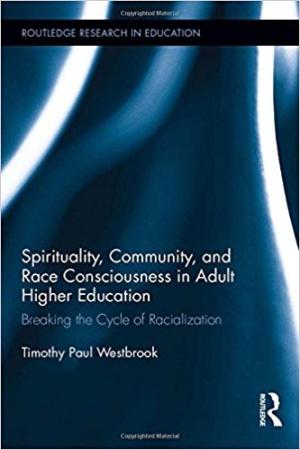
Drawing on the lived experiences of Black students in adult degree completion programs at predominantly White, Christian institutions in the southern United States, this book presents a model for reimagining adult higher education. Westbrook explores the reasons students enrolled in degree programs, how they experience their predominantly white institutions, and how their experiences affect their lives. Employing Critical Race Theory and Christian theology as frameworks for evaluating the students’ experiences, the author sheds light on the ways African American experiences to inform, critique, and shape Christian adult learning in higher education. (From the Publisher)
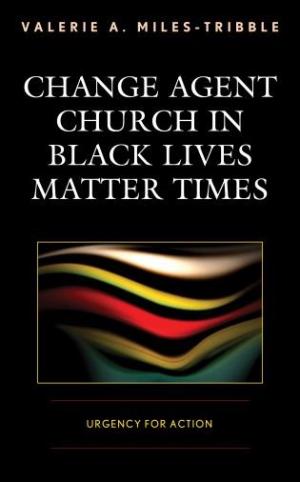
Volatile social dissonance in America’s urban landscape is the backdrop as Valerie A. Miles-Tribble examines tensions in ecclesiology and public theology, focusing on theoethical dilemmas that complicate churches’ public justice witness as prophetic change agents. She attributes churches’ reticence to confront unjust disparities to conflicting views, for example, of Black Lives Matter protests as “mere politics,” and disparities in leader and congregant preparation for public justice roles. As a practical theologian with experience in organizational leadership, Miles-Tribble applies adaptive change theory, public justice theory, and a womanist communitarian perspective, engaging Emilie Townes’s construct of cultural evil as she presents a model of social reform activism re-envisioned as public discipleship. She contends that urban churches are urgently needed to embrace active prophetic roles and thus increase public justice witness. “Black Lives Matter times” compel churches to connect faith with public roles as spiritual catalysts of change. (From the Publisher)
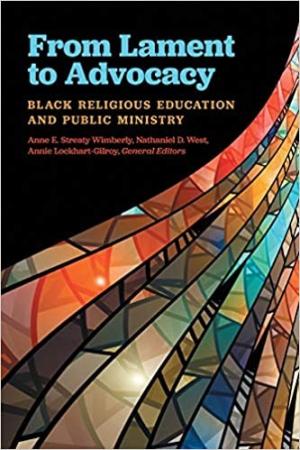
This resource sets forth the cultural imperatives of ministry and the contextual nature of a public theology of religious education that connects faith formation and action in addressing profoundly difficult, unjust, and wounding experiences of Black people in society. The book begins with the, often neglected, practice of lament as a necessary first step in vital public theological reflection and action. The book proceeds with meanings and ways of equipping persons within and beyond church settings to critically reflect on life and leadership in the throes of present-day social and political realities. It further provides practices for forming skills and shows how to partner with the spiritual guides needed to shape a just public arena and fruitful individual lives. (From the Publisher)